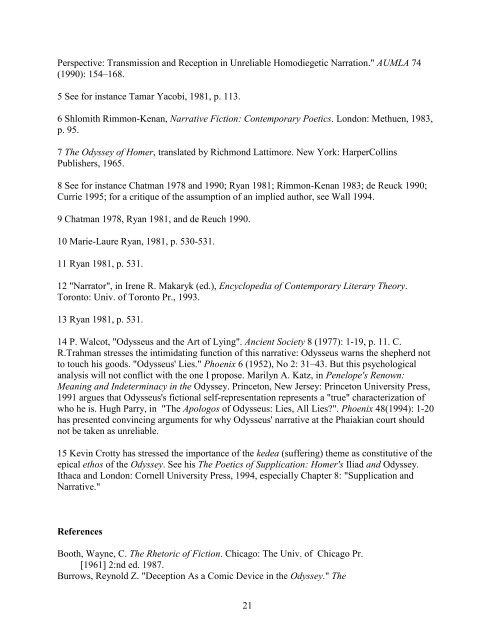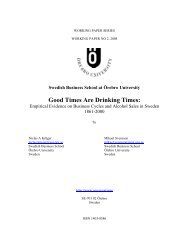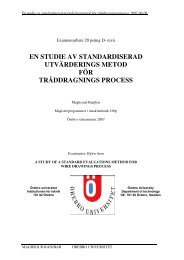Stories in Disguise: On Odysseus' Ithacan Lies and Their Relevance ...
Stories in Disguise: On Odysseus' Ithacan Lies and Their Relevance ...
Stories in Disguise: On Odysseus' Ithacan Lies and Their Relevance ...
Create successful ePaper yourself
Turn your PDF publications into a flip-book with our unique Google optimized e-Paper software.
Perspective: Transmission <strong>and</strong> Reception <strong>in</strong> Unreliable Homodiegetic Narration." AUMLA 74<br />
(1990): 154–168.<br />
5 See for <strong>in</strong>stance Tamar Yacobi, 1981, p. 113.<br />
6 Shlomith Rimmon-Kenan, Narrative Fiction: Contemporary Poetics. London: Methuen, 1983,<br />
p. 95.<br />
7 The Odyssey of Homer, translated by Richmond Lattimore. New York: HarperColl<strong>in</strong>s<br />
Publishers, 1965.<br />
8 See for <strong>in</strong>stance Chatman 1978 <strong>and</strong> 1990; Ryan 1981; Rimmon-Kenan 1983; de Reuck 1990;<br />
Currie 1995; for a critique of the assumption of an implied author, see Wall 1994.<br />
9 Chatman 1978, Ryan 1981, <strong>and</strong> de Reuch 1990.<br />
10 Marie-Laure Ryan, 1981, p. 530-531.<br />
11 Ryan 1981, p. 531.<br />
12 "Narrator", <strong>in</strong> Irene R. Makaryk (ed.), Encyclopedia of Contemporary Literary Theory.<br />
Toronto: Univ. of Toronto Pr., 1993.<br />
13 Ryan 1981, p. 531.<br />
14 P. Walcot, "Odysseus <strong>and</strong> the Art of Ly<strong>in</strong>g". Ancient Society 8 (1977): 1-19, p. 11. C.<br />
R.Trahman stresses the <strong>in</strong>timidat<strong>in</strong>g function of this narrative: Odysseus warns the shepherd not<br />
to touch his goods. "<strong>Odysseus'</strong> <strong>Lies</strong>." Phoenix 6 (1952), No 2: 31–43. But this psychological<br />
analysis will not conflict with the one I propose. Marilyn A. Katz, <strong>in</strong> Penelope's Renown:<br />
Mean<strong>in</strong>g <strong>and</strong> Indeterm<strong>in</strong>acy <strong>in</strong> the Odyssey. Pr<strong>in</strong>ceton, New Jersey: Pr<strong>in</strong>ceton University Press,<br />
1991 argues that <strong>Odysseus'</strong>s fictional self-representation represents a "true" characterization of<br />
who he is. Hugh Parry, <strong>in</strong> "The Apologos of Odysseus: <strong>Lies</strong>, All <strong>Lies</strong>?". Phoenix 48(1994): 1-20<br />
has presented conv<strong>in</strong>c<strong>in</strong>g arguments for why <strong>Odysseus'</strong> narrative at the Phaiakian court should<br />
not be taken as unreliable.<br />
15 Kev<strong>in</strong> Crotty has stressed the importance of the kedea (suffer<strong>in</strong>g) theme as constitutive of the<br />
epical ethos of the Odyssey. See his The Poetics of Supplication: Homer's Iliad <strong>and</strong> Odyssey.<br />
Ithaca <strong>and</strong> London: Cornell University Press, 1994, especially Chapter 8: "Supplication <strong>and</strong><br />
Narrative."<br />
References<br />
Booth, Wayne, C. The Rhetoric of Fiction. Chicago: The Univ. of Chicago Pr.<br />
[1961] 2:nd ed. 1987.<br />
Burrows, Reynold Z. "Deception As a Comic Device <strong>in</strong> the Odyssey." The<br />
21

















